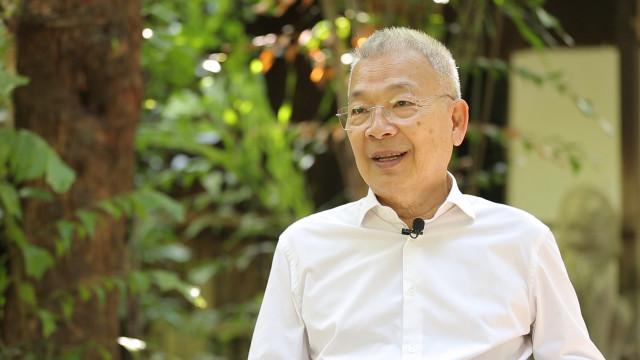Ethnologist Ang Choulean: the Rich and Complex World of Spirits in Cambodian tradition

- By Po Sakun
- and Teng Yalirozy
- March 20, 2022 5:37 PM
Ranging from pure spirits to partially human, some of them are protectors while others must be feared, he said
PHNOM PENH—Deeply rooted in the country’s traditions, the world of spirits is a complex one in which souls and beings play specific roles and must be respected, according to Ang Choulean.
During a recent conference at the Royal University of Fine Arts (RUFA) in Phnom Penh, which was posted on RUFA’s Facebook page, Choulean explained that, according to Cambodian traditions and legends, spirits have different origins and may live in the visible and/or invisible world.
An internationally-renowned Cambodian ethnologist—an anthropologist specializing in the study traditions and beliefs in a society—Choulean said that there are roughly two categories of spirits for Cambodians: those with specific roles and those with no set role.
Spirits that people cannot clearly identify are the ones who usually scare Cambodians the most, he said. “Have you ever heard people say, ‘[o]h, do not go there! I used to go and the place is really haunted,’ and we don’t know what that being who scares people look like,” he asked the audience.
Identified spirits with specific roles have human origins, Choulean said. There are seven categories of these spirits who are either strictly spirits, partially spirits or partially humans.
The spirits include male guardian spirits, mothers from previous lives, evil spirits and guardian spirits of a house, he said. The partially-spirit and partially-human ones include the krasue also known as ahp, witches and religious recluses.
Male guardian spirits are believed to usually stay in the countryside where villagers pray to them for rain and good crops, Choulean said.
“We never see people in Phnom Penh holding ceremonies for male guardian spirits,” he said. “However in Siem Reap Province, villagers hold ceremonies to them twice a year. In other provinces, they also pay homage to the male guardian spirits.”
In the Cambodian tradition, mothers from previous lives are believed to be mothers of newborns in the past, Choulean said. The mother loves and wants her child to go back to live with her: She usually stays close to the baby from birth until about three years of age, he said.
Therefore, until a child reaches three years old, the mother and father must take great care of him or her, Choulean said. Otherwise, the mother from previous lives may have the opportunity to take the baby's soul back at any time, he said.
Unidentified non-human spirits are only female and can be a young woman who was strangled or drowned, Choulean said, adding that the most vicious ones are the ghosts of women who died in childbirth.
Then, there is the guardian spirit of a house who can only be found in a house and has the power to protect the household, he said.
Speaking of the krasue also called ahp who are half human and half spirit, Choulean explained that this is an ordinary person but who is lazy, does not bathe, does not like to grow crops, and likes to walk during the day, asking villagers for vegetables and spices. Then at night or when it rains, he said, a krasue is believed to remove his head from his body and, with his luminous intestines visible, will fly low to look for food. For a krasue, the most delicious food is the blood from a woman who has just given birth, Choulean said.
Finally, an anchorite can be half human and half spirit, he said. In the past, an anchorite was a person who lived as recluse, away from people, in the forest, the mountains or in caves. In Cambodian tradition, an anchorite can have the power to fly.
These are some of the beliefs that can be found in the country’s tradition and go back centuries, Choulean concluded.
A professor at the Royal University of Fine Arts, Ang Choulean was a recipient of Japan’s Fukuoka Grand Prize in 2011. According to a jury member, Choulean’s study on supernatural beings in Cambodian tradition was groundbreaking and has opened new horizons in Cambodian ethnology.
Choulean is an advisor to the Apsara National Authority in Cambodia—the government agency managing the Angkor Archeological Park.















